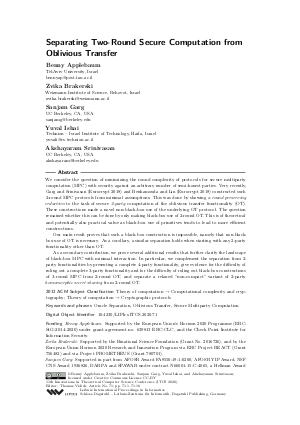@InProceedings{applebaum_et_al:LIPIcs.ITCS.2020.71,
author = {Applebaum, Benny and Brakerski, Zvika and Garg, Sanjam and Ishai, Yuval and Srinivasan, Akshayaram},
title = {{Separating Two-Round Secure Computation From Oblivious Transfer}},
booktitle = {11th Innovations in Theoretical Computer Science Conference (ITCS 2020)},
pages = {71:1--71:18},
series = {Leibniz International Proceedings in Informatics (LIPIcs)},
ISBN = {978-3-95977-134-4},
ISSN = {1868-8969},
year = {2020},
volume = {151},
editor = {Vidick, Thomas},
publisher = {Schloss Dagstuhl -- Leibniz-Zentrum f{\"u}r Informatik},
address = {Dagstuhl, Germany},
URL = {https://drops.dagstuhl.de/entities/document/10.4230/LIPIcs.ITCS.2020.71},
URN = {urn:nbn:de:0030-drops-117560},
doi = {10.4230/LIPIcs.ITCS.2020.71},
annote = {Keywords: Oracle Separation, Oblivious Transfer, Secure Multiparty Computation}
}

 Creative Commons Attribution 3.0 Unported license
Creative Commons Attribution 3.0 Unported license


